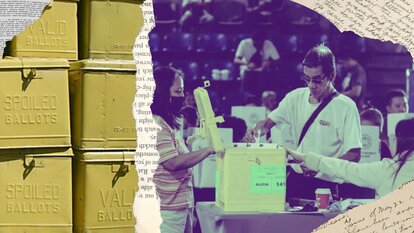Local Elections
The Barangay Elections and the Presidency

Barangays, the smallest administrative division in the Philippines that serves as the basic political and administrative unit, are indispensable components in the campaigns of local, and even national politicians. Barangay officials are seen as delivering votes for elective government posts in all levels, and remain as vital cogs in the machinery of patronage politics.
“The results of barangay elections today are going to have an effect on the results of midterm elections and subsequently in national elections,” President Ferdinand “Bongbong” Marcos, Jr. told reporters after casting his vote for the barangay elections last October 30 in Batac City, Ilocos Norte.
The barangay elections are supposed to be nonpartisan as stipulated in Section 4 of the General Provisions of the Barangay Elections Act of 1982, which was passed when the president’s father was still in office.

Underscoring the partisan nature of the barangay elections was the case of a mayor from Bicol who ordered that the counting and canvasing of the election results be stopped. The Chairman of the Commission on Elections (COMELEC), Atty. George Garcia, stated the obvious—he did it because his preferred candidates were losing. Garcia candidly used the term “bata-bata”, which can be translated as minions, lackeys, or henchmen.
Both the COMELEC and the Philippine National Police, in several statements, have declared the nationwide 2023 Barangay and Sanguniang Kabataan Elections as successful—it is generally peaceful, orderly, and credible. This could also mean that the political patrons—the mayors, for example—were well behaved, or, at least, very discreet, reticent and covert in giving support to their “candidates”.
As for the president’s statement, coming to his defense was a senatorial candidate of the Liberal Party (LP) during the 2019 midterm elections.
“There is this growing misconception that the provision mandates that barangay officials are supposed to be nonpartisan,” prominent and respected election lawyer, Romulo Macalintal (2023), clarified. “But this provision is very clear: it is the barangay election that is nonpartisan. There is nothing in the law that says the elected barangay officials shall be nonpartisan. As a matter of fact, a number of these officials are members of different political parties.”

Former Budget Secretary and LP President, Florencio “Butch” Abad, once described the country’s presidential system as being a case of “winner takes all”. Thus, the party of the newly elected president becomes the dominant party in congress even though it managed to win only a handful of candidates. The same is true for local government officials, from the provincial governors and city mayors down to the municipal councilors, who would immediately take their oaths as new members of the ruling party.
Unlike his predecessor, Rodrigo Duterte, Marcos is careful and cautious in communicating, seldom deviating from prepared speeches. His forthright acknowledgement of the role of barangays and their officials in affecting the outcome of the national elections illustrates the political pyramid where those in the top need to ensure a strong base, the barangay (roughly translated as village or commune) being the country’s smallest political unit.
The reliable loyalty of, and the capacity to deliver votes by the barangay captain and other officials to his patron, and this patron to his larger patron, and so on and so forth up to the pinnacle of the power chain, are seen as essential for the electoral victory of top national candidates.
Patronage politics is considered as a major hindrance to the country’s political maturity as well as good governance, which, in turn, seriously impact the country’s economy, and social and cultural wellbeing. Having a firm hold to the grassroots, the worst aspects of patronage politics are deeply embedded.